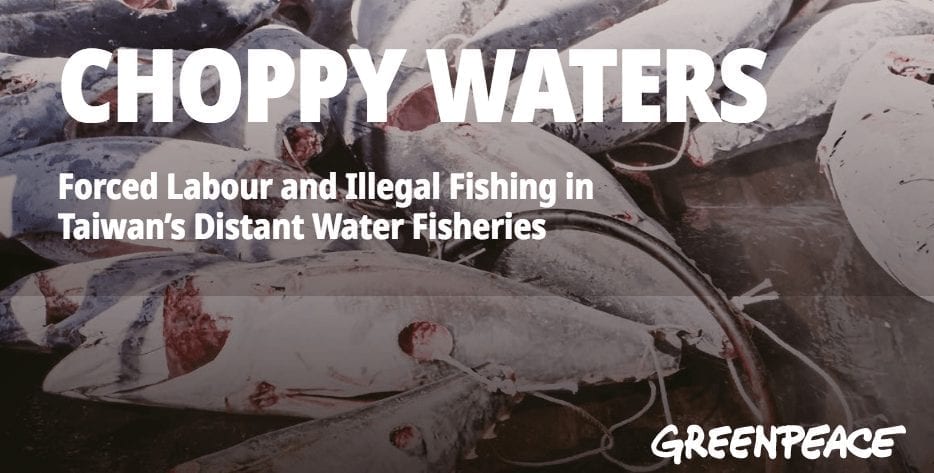
Choppy Waters – Forced Labor and Illegal Fishing in Taiwan’s Distant Water Fisheries
An investigation conducted by Greenpeace East Asia, involved interviews with migrant fishers from three fishing vessels that were either flagged or linked to Taiwan. We found that IUU fishing and forced labour, allegedly, still continue to happen aboard Taiwanese fishing vessels operating in the Atlantic Ocean.
Taiwan is one of the world’s largest distant water fishing (DWF) powers, with over 1,100 Taiwanese-flagged vessels fishing across our oceans and hundreds more Taiwanese-owned vessels flagged to other countries.1 Taiwan is also home to Fong Chun Formosa Fishery Company, Ltd. (FCF), which has been ranked as one of the top three tuna traders in the world.23 FCF’s position as a global player was recently strengthened with the purchase of US canned tuna company Bumble Bee, further securing its place as a major supplier of tuna to consumers in the United States.4
In recent years, investigations have revealed shocking cases of human rights abuses in fisheries, including forced labour and human trafficking, and identified Taiwanese vessels and companies among the worst offenders. Even though the Taiwanese government has recently amended relevant regulations, progress has not been enough: both government and corporates continue to fail to protect the human rights of migrant fishers in the Taiwanese distant water fishing fleet. In Greenpeace East Asia reports Made in Taiwan (2016) and Misery at Sea (2018), Greenpeace East Asia documented the “laissez-faire” attitude from the Taiwanese Fisheries Agency (TFA) towards both illegal, unreported, and unregulated (IUU) fishing and human rights abuses, and pointed out the influential role FCF could play in eradicating these practices.
This report is based on a 2019 investigation conducted by Greenpeace East Asia, involving interviews with migrant fishers from three fishing vessels that were either flagged or linked to Taiwan. We found that IUU fishing and forced labour, allegedly, still continue to happen aboard Taiwanese fishing vessels operating in the Atlantic Ocean. The investigation indicates that violations of labour and human rights related laws seem to remain commonplace in Taiwan’s distant water fishing fleet, where over 20,000 migrant workers, most of whom are hired overseas from Indonesia and the Philippines, are employed.5 The labour conditions reported might violate relevant Taiwanese regulations and they fulfil seven of the eleven International Labour Organization (ILO) indicators of forced labour.
Read the full report here.
